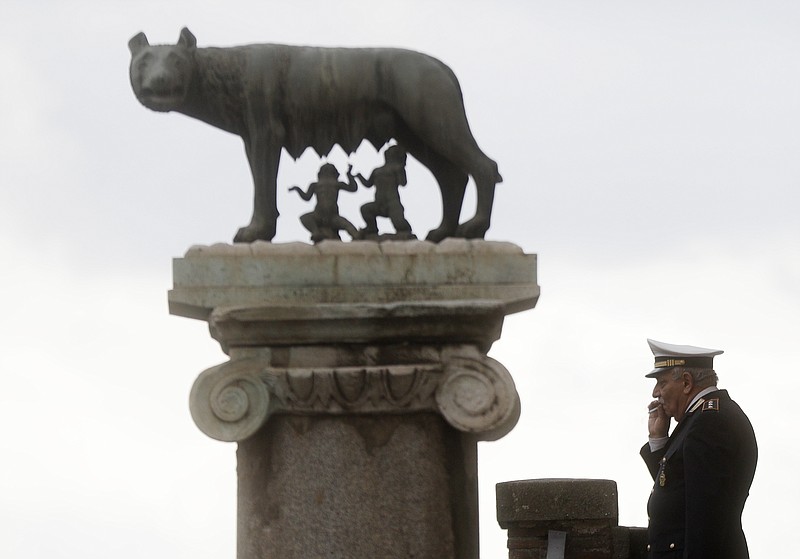ROME (AP) - Hurt by Britain's planned exit, European Union leaders are making a pilgrimage to Rome this weekend with the hope that a visit to the cradle of their project of unity can somehow rekindle the vigor of youth.
Saturday marks the 60th anniversary of the signature of their solemn bond, which started with six founding nations but steadily grew to 28. But the biggest setback in the EU's history looms next week when Britain officially triggers negotiations to become the first nation to leave the bloc.
"Ever closer union" - long the mantra of the EU - pointed toward a seamless continent and an economic and political juggernaut. Now others, beyond Britain with its divorce plans, are looking for more of a "living apart together" relationship.
The climax of Saturday's ceremonies will be the adoption of a Rome Declaration, a blueprint for the way ahead. But at least two countries continued to have objections to what many would consider a harmless statement to rally all member states.
Poland, which seems poised to take over Britain's mantle of major recalcitrant member, wants more assurances all its requirements are met.
"If the declaration does not include points that are of priority to Poland, we will not accept the declaration," Prime Minister Beata Szydlo said.
Greece, scarred by the financial crisis and the tough conditions the 19 nations sharing the euro currency imposed on Athens' bailout, is also balking.
"This isn't our Europe," Prime Minister Alexis Tsipras said in Rome. "We want to change this Europe, to say no to the Europe of fear, of unemployment, of poverty, and say yes to the Europe that takes care of social needs."
The EU's Rome summit, while vowing unity, could instead be a watershed moment in moving away from it and toward a more practical road of partial alliances on certain issues.
The bloc has proven in the past to be less than unified in decision-making on issues such as the single euro currency to the Schengen zone of unfettered travel, but it always left a taste of being less than perfect.
Now, when projects languish all too often because of a lack of unanimity, even founding nations realize things have to change.
"Different paths of integration and enhanced cooperation could provide for effective responses to challenges that affect member states in different ways," the Netherlands, Belgium and Luxembourg said in a joint statement earlier this year.
Some call it a two-speed Europe, or a Europe of concentric circles, but it would allow nations to move ahead and no longer be held back by others.
Last month, EU Commission President Jean-Claude Juncker told the Belgian parliament that "I no longer want member states to block others that want to go further."
It is that concern about paralysis that pushed the EU to look for other options.
If Britain does not show up this weekend in Rome, leaders will be looking at France with concern. With French President Francois Hollande leaving in May, there is the specter of a possible election victory by Marine Le Pen, the far-right candidate and another anti-EU populist.
Further down the road are the elections in Germany in September, where the far-right Alternative for Germany could become a factor.
Even in the heart of Italy, another founding member, the EU is no longer at peace. The 5-Star Movement founded by comic Beppe Grillo is riding highest in the polls and wants a referendum on whether to stay in the eurozone. It has been highly critical of most things EU.
Laura Agea, a member of the European parliament, said that what the EU's founders set out to do with the 1957 treaty has been turned upside down.
"It's exactly the opposite. The drift under the eyes of bureaucrats and great financial powers has created a market anything but united," highlighting the north vs. south divide created by the financial crisis, Agea said.
This weekend's largely symbolic events won't change that, said Luigi Di Maio of the 5-Star Movement, the vice president of Italy's Chamber of Deputies.
___
Associated Press writer Frances D'Emilio contributed.
